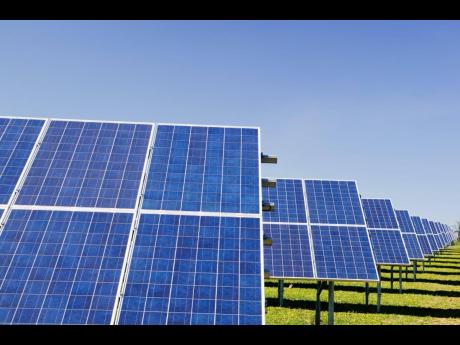Kenton Palmer | Is JPS unwittingly an obstacle to alternative energy?
Global warming has a far greater impact on countries in the Caribbean region. When problematic weather conditions occur, the restoration of energy supplies is always at the forefront of any meaningful recovery. Sadly, in Jamaica, we are in a challenging situation that will worsen if we do not act effectively.
Barbados’ target is to be 100 per cent reliant on renewable energy by 2030. This is very ambitious, especially considering that this island produces 40 per cent of its fossil fuel requirements. However, the Government has taken significant legislative steps to support this objective.
Trinidad aims to achieve 30 per cent reliance on renewable energy by 2030. Electricity in Trinidad is exceedingly inexpensive. Customers need to be incentivised to install alternate sources of electricity, particularly solar. Thus, the plan is to increase electricity costs by as much as 200 per cent. Even then, an alternative project would not be economically feasible.
In Jamaica, the National Renewable Energy Policy 2009-2030 document is a public relations missive loaded with misrepresentations. After 15 years, only a few promises and targets have been attempted. Of note are the promised fiscal incentives and net metering, two critical features to encourage investment in alternate energy sources.
Solar investment is what could be described as ‘transport cost money’ and ranges from a low of J$2 million (motorbike) to a high of about J$7 million (medium-sized SUV). Is Government helping or hindering citizens from achieving the country’s renewable energy goals? Let us examine the glaring obstacles and then offer some solutions.
OBSTACLES
Obstacle 1: The Government should have removed duty totally on solar equipment much sooner. There still needs clarity on whether the duty on batteries has been removed. Importers risk financial harm when directives are not properly implemented. Battery price can be as much as 40 per cent of the total installation cost.
Obstacle 2: The essential objective is for all installations to be attached to the grid. As expected, the connection to the grid is shrouded in red tape. The cost can be exceedingly prohibitive at about J$150k per connection. A customer with an 800KWH demand per month using an 8KW inverter would generate about 100KWH in excess to sell to JPS for a net gain of J$1,700. This translates to a payback period of over 10 years, a significant disincentive. Still, it gets worse.
Compare two installations with the same profile as above with one being grid-tied and the other off the grid. The system on the grid could be worse off. In the grid-tie scenario, the inverter must constantly check and mirror the frequency and phase-angle profile of the JPS supply. This continuous process takes power from the JPS at their tariff rate, which is a whopping three and a half times what the JPS pays the customer. In a bad month, grid-tie customers could supply the JPS with more power than they receive but ends up with a big bill.
Obstacle 3: Net billing is the biggest hindrance to investment in solar systems. The JPS gets the bulk of gains when customers are grid-tied. The JPS currently nets 9 per cent of gross sales or J$6.2 per KWH. It costs the JPS J$62.8 to produce one KWH, and the company sells it for J$69. When the JPS purchases from a grid-tie customer, they pay J$20.4 per KWH and, in turn, sells for J$69 per KWH, earning a whopping margin of J$48.6 or 70 per cent. The JPS could become incredibly wealthy on the backs of unsuspecting customers who invested heavily.
The Government must take the lead in determining the way forward. Does the Government understand the issues sufficiently to make the right decisions? The current arrangements with the JPS regarding grid-tie are not in the country’s best interest.
SOLUTIONS
Solution 1: The matter regarding duty on solar equipment can be resolved almost immediately. The fact that a few people might abuse the process is not reason enough to deny the country the vast benefit to be derived from this transformation.
Solution 2: Initiate net metering instead of net billing. Renewable energy installations should not tilt to the benefit of the JPS but incentivise those risking capital for this new venture. This would reduce the payback period by 9 to 15 months, making the projects far more affordable.
Solution 3: The NHT has the platform for a one-stop shop for financing energy projects. Funding could come from both the public and private sectors. Government guarantees would lower costs as well. This consolidated approach would allow the Government useful information for legislative purposes.
Solution 4: The Government could create incentive programmes for businesses that fund renewable-energy projects. For example, companies could provide renewable- energy solutions to customers at monthly fees but still own the equipment. This strategy commonly occurs in the United States. Another solution is for companies to provide financial assistance on a lease-purchase basis. In this option, customers pay the equivalent amount they would pay the JPS monthly for the KWH used. After deducting monthly loan repayment and financial charges, the balance would be applied to the remaining loans, thereby building equity into the projects. Ownership would be transferred when the loans are fully repaid.
Solution 5: As a show of commitment, the public sector should be incentivised to be one hundred per cent reliant on renewable energy. Considering their purchasing power and scale of operations, the payback period could be less than three years. This would be free electricity for the next seven years.
There are potentially effective and easily implemented solutions to Jamaica’s energy requirements on which the Government must take the lead. Time is of the essence.
Kenton Palmer is an electrical engineer, a former managing director of Crown Caribbean, a Caribbean group of companies. Send feedback to columns@gleanerjm.com and kentonpalmer@yahoo.com.


